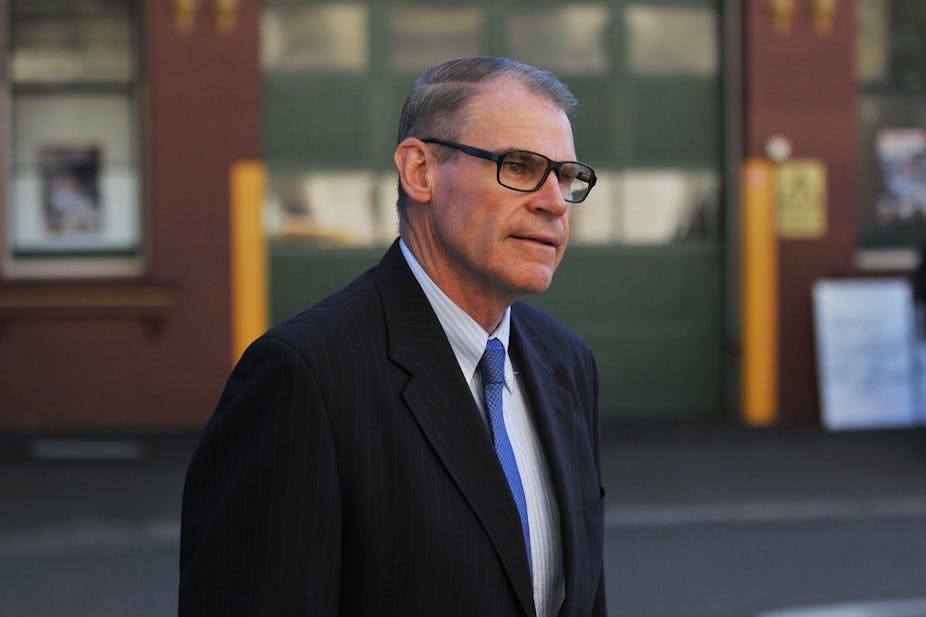Labor elder John Faulkner has called for a radical overhaul of the party’s structure that would drastically reduce union representation at its state conferences.
Faulkner, who has been a continuing voice for ALP reform, said in a speech tonight that state conferences should eventually comprise 60% of delegates elected directly by the rank and file, 20% by unions and 20% by the party’s electorate councils.
At present half the delegates to state conferences come from affiliated unions, although these unions represent only a portion of the 17% of the workforce who are unionists.
Faulkner’s plan would have the union delegates directly elected by union members, thwarting the power of union officials to nominate them.
The change should be phased in stages over the next three ALP national conferences (which meet every three years) Faulkner said, delivering the inaugural address of the Light on the Hill Society.
Opposition leader Bill Shorten has called for a re-look at the unions’ role in the party, but has so far canvassed only minimal changes.
Faulkner said unions were and would remain important for Labor, a connection to progressive ideas, economic justice and solidarity.
But all too often they were viewed and behaved in the Labor party as just large faceless institutions controlled by secretaries who were in turn obedient to factional cartels.
Union members should have a direct say, just like party members should – rather than having their opinions filtered through layers of delegation. For a deeper relationship with organised labour the ALP should encourage unionists to join the party and participate directly, Faulkner said.
He said that in determining union affiliation numbers, unions should only be able to count members who agreed to their membership being included towards that affiliation in an opt-in system.
“All union delegates to party conferences should be elected through a ballot of union members, conducted under the principle of proportional representation, and should not be appointed without election.”
Faulkner said his proposed structure would still see over-representation of unions at conferences compared with unionisation of the workforce.
A central theme of Faulkner’s speech was the need for Labor to take a lead, especially by reforming itself, in responding to the “trust deficit” that exists in today’s politics.
One aspect of this trust deficit was around the role of money in politics.
“In Australia, as in other democracies around the world, the potential for large and undisclosed sums of money in election and campaign financing has become more and more a matter of concern to the public.
"These perceptions of possible influence need not be only concerns about potential undue influence in the narrow sense of how government decisions are made, but in a broader sense: concern that parties and politicians dependent on large donors will be if not compliant, then at least receptive, or that large donors and fundraisers may get access that others do not.
"The perception of undue influence can be as damaging to democracy as undue influence itself. It undermines confidence in our processes of government, making it difficult to untangle the motivation behind policy decisions.”
He said the “stench of corruption” around the NSW Labor party must be eliminated – “failing to act is not an option”.
“The party which gave you Eddie Obeid, Ian Macdonald and Craig Thomson, and promoted Michael Williamson as its national president must now be open to scrutiny and its processes subject to the rule of law.
"In fact, I believe that the rules and decisions of all political parties should be justiciable, and that state and federal governments should consider making a party’s eligibility for public funding contingent upon it.”
The practice of factions, affiliates or interest groups binding parliamentarians in caucus votes or ballots “must be banned”.
Referring to the revelations at the NSW Independent Commission Against Corruption, which have exposed Liberal wrongdoing over donations, Faulkner said “The recent events in New South Wales should motivate all Australian political parties to work together for far-reaching and long-overdue reform of our electoral donations, funding and expenditure laws. This is a real and urgent challenge for all political leaders”.
Faulkner said ALP preselections “ought to be the opportunity to determine who is best suited to campaign for Labor values in the community and legislate for them in parliament”; he supported the community preselections trialled in NSW with weighted votes from party members equalling declared supporters. These should become the rule rather than the exception.
Lamenting the lack of will among the powerful within the party to stand up for reform, Faulkner said: “The existing and widening chasm between Labor’s commitment to democracy and our internal practice of it, between our focus on the future and our antiquated organisation, undermines our policy agenda and casts doubt on its authenticity.
"I say to those who resist the opening up of our structures to more participation and more democracy, because they see their control over managed and pre-negotiated outcomes slipping away – stop clinging to the wheel. You are steering us straight for the rocks.”

